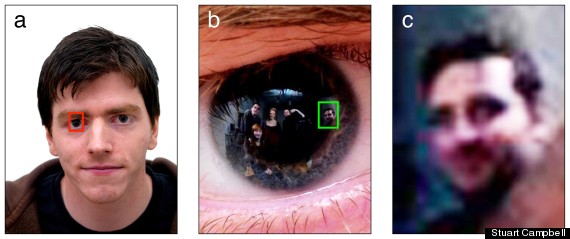Scientists in the U.K. are eyeing a remarkable new crime-fighting tool -- one that makes it possible to finger the bad guys simply by examining the reflections seen in the eyes of their victims.
"For crimes in which the victims are photographed (e.g., hostage taking, child sex abuse), reflections in the eyes of the photographic subject could help to identify perpetrators," the researchers wrote in an article describing their research, which was published online Dec. 26 in the journal PLOSONE.
For their study, the researchers snapped passport-style photos of undergraduate students as they faced five other people standing nearby. Then the scientists dramatically enlarged the photos, zooming in on the minute reflections of the bystanders visible in the pupils of the students' eyes.

Zooming in on the subject's eye reveals hidden bystanders.
“The pupil of the eye is like a black mirror," Dr. Rob Jenkins, a psychologist at the University of York, said in a written statement. "To enhance the image, you have to zoom in and adjust the contrast. A face image that is recovered from a reflection in the subject’s eye is about 30,000 times smaller than the subject’s face."
Next, the researchers asked 32 men and women -- half of them familiar with the bystanders and half unfamiliar with them -- to match the reflected images to conventional photographs of the bystanders.
Could people identify the faces in the eye reflections? For the most part, yes. The men and women who were unfamiliar with the bystanders’ faces were 71 percent accurate at the matching task, while students who were familiar with the faces were 84 percent accurate at making the match.
"Our findings thus highlight the remarkable robustness of human face recognition, as well as the untapped potential of high-resolution photography,” Jenkins wrote in the statement.
The researchers indicated that police might be able to use their technique to link suspects to crimes. But they cautioned that their research also spotlights an under-appreciated risk in sharing all those snapshots we take.
"It reminds us that we should be careful how we share our own photos," Jenkins told The Huffington Post in an email. "Eyes in the images may reveal more than we think about where we were and who we were with. Around 40 million photos per day are uploaded via Instagram alone, and camera resolution is doubling roughly every 12 months."